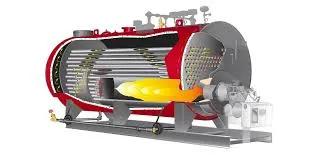
نوفمبر . 07, 2024 10:19 Back to list
Understanding the Fuel Types Used in Biomass Boilers for Energy Production
Understanding Biomass Boilers What Do They Burn?
Biomass boilers are an increasingly popular choice for heating and energy production, particularly as the world moves towards more sustainable and renewable energy sources. The key aspect that distinguishes biomass boilers from traditional fossil fuel boilers is their ability to burn organic materials. But what exactly do biomass boilers burn? In this article, we will explore the various types of biomass fuels, their benefits, and the overall impact on energy production and the environment.
What is Biomass?
Biomass refers to any organic material that comes from plants and animals. It includes a wide range of materials, such as wood, agricultural crops, manure, municipal waste, and even certain types of algae. Biomass can be considered a renewable energy source because, unlike fossil fuels, it can be re-grown and replenished over a short period.
Types of Biomass Fuels
1. Wood Pellets One of the most common sources of biomass fuel is wood pellets. These are made from compressed sawdust and wood shavings and are known for their high energy content and low moisture levels. Wood pellets are easy to handle and can be fed automatically into a biomass boiler.
2. Chips and Logs Wood chips and logs are also used as biomass fuels. They are larger than pellets and may require a different combustion system, such as a chip boiler. While they are generally less processed than pellets, they can still provide a significant amount of heat.
3. Agricultural Residues Leftover materials from agricultural processes, such as straw, corn stover, and rice husks, are another source of biomass fuel. These materials often go to waste, so utilizing them for energy production can reduce environmental impact and provide additional income for farmers.
4. Animal Manure Livestock waste is a biomass resource that can be converted into bioenergy. Manure can be processed through anaerobic digestion to produce biogas, which can then be used to generate heat and electricity.
5. Dedicated Energy Crops Certain crops are specifically grown for energy production, such as miscanthus or switchgrass. These crops are high-yielding and can be harvested annually, making them a sustainable option for biomass energy.
what does a biomass boiler burn

6. Municipal Solid Waste Biomass boilers can also utilize organic materials found in municipal solid waste, although this approach is less common due to concerns about emissions and the variability of waste composition.
Benefits of Biomass Fuel
Biomass boilers provide several advantages over traditional fossil fuel boilers. First and foremost, they help reduce greenhouse gas emissions. Biomass is considered carbon-neutral because the carbon dioxide released during combustion is roughly equal to the amount absorbed by the plants during their growth. This cycle helps to mitigate climate change impacts.
Furthermore, biomass fuels can contribute to energy security by reducing dependence on imported fossil fuels. Utilizing locally-sourced biomass can stimulate the economy, create jobs in rural areas, and provide a reliable fuel supply.
Another benefit is versatility. Biomass can be used not only to heat buildings but also to generate electricity, offering a multi-faceted approach to energy production.
Challenges and Considerations
While biomass boilers offer numerous benefits, there are challenges associated with their use. Sourcing sustainable biomass is crucial; over-exploitation of resources can lead to deforestation and loss of biodiversity. Additionally, the combustion of biomass can produce emissions if not managed properly. Therefore, advancements in technology and stricter regulations are needed to ensure that biomass energy remains a clean and sustainable option.
Conclusion
Biomass boilers represent a promising solution for renewable energy production by utilizing a wide variety of organic materials as fuel. From wood pellets to agricultural residues, the potential for biomass to provide heat and power is vast. As we continue to strive for a more sustainable future, understanding the role of biomass and its applications in energy production will be crucial. By harnessing local resources and promoting responsible management practices, biomass can help us transition away from fossil fuels while addressing the global challenge of climate change.
-
High-Efficiency Gas Thermal Oil Boilers | HPT Models
NewsJul.31,2025
-
Oil Fired Hot Water Boilers Sale - High Efficiency & Affordable
NewsJul.31,2025
-
High-Efficiency Commercial Oil Fired Steam Boiler for Industry
NewsJul.30,2025
-
High-Efficiency Biomass Fired Thermal Oil Boiler Solutions
NewsJul.30,2025
-
High Efficiency Gas Fired Thermal Oil Boiler for Industrial Heating
NewsJul.29,2025
-
High-Efficiency Gas Fired Hot Water Boiler for Sale – Reliable & Affordable
NewsJul.29,2025
Related PRODUCTS






















